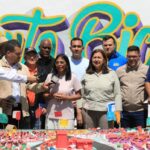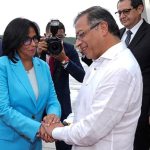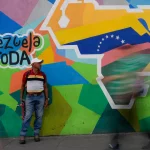
By Reinaldo Iturriza López, translation by Nicolas Allen
On Monday, January 28, the Department of the Treasury of the United States announced it was placing a “block” on all of Petróleos de Venezuela’s (PDVSA) assets under US jurisdiction, prohibiting its citizens from engaging in any type of transaction with the Venezuelan state-owned oil company.[1] Secretary Steve Mnuchin added that “if the people of Venezuela want to continue to sell us oil”, we will only accept it on the condition that our money goes to “blocked accounts”, which would later be made available for the “transition government”.[2]
According to National Security Advisor John Bolton, the sanctions imposed on PDVSA would provoke a loss of some 11 billion dollars in exports for 2019, and a freeze on 7 billion dollars in assets.
On January 24th, Bolton declared on FOX Business, “It will make a big difference to the United States economically if we could have American oil companies invest in and produce the oil capabilities in Venezuela”. Just three minutes before effectively confessing the true intentions of US imperialism, Bolton asserted that Chávez and Maduro had “impoverished Venezuela. We now have between three and four million refugees who have fled the country, something unprecedented in the history of the Western Hemisphere. Maduro and Hugo Chávez before him systematically looted the oil resources of the country. There is no capital investment, and income is declining. Society is literally collapsing in Venezuela”. These factors, Bolton continued, provide the justification for the Trump Administration’s recognition of Juan Guaidó as “Interim President”.[3]
A few hours after sanctions were publicly announced, on January 29, the Venezuelan National Assembly approved an “Agreement for the Promotion of a National Rescue Plan”, which upheld that Venezuela was experiencing a “social and economic collapse” that had produced a “humanitarian emergency”, consequence of the policies of the “regime of Nicolás Maduro”, which has installed a “totalitarian economic and political model for domination and social control”, otherwise known as “21st century socialism”.[4]
Behold, a concise summary of the way in which foreign and local agents put in practice what Naomi Klein defined as “disaster capitalism” in her formidable Shock Doctrine– a useful framework for understanding what is happening in Venezuela, at a time when forces are conspiring to severely – if possible, irreparably – affect our ability to interpret our own present.
With “disaster capitalism”, Klein refers to “orchestrated raids on the public sphere in the wake of catastrophic events, combined with the treatment of disasters as exciting market opportunities”.[5] It took place first in Chile under the Pinochet dictatorship, but also in New Orleans following Hurricane Katrina; in Sri Lanka after the 2004 tsunami; in Iraq after the US invasion of 2003; in the US after the attacks of September 11, 2001; in China after Tiananmen; in 1993 under Yeltsin’s Russia, and so on. In each case, Klein explains, the attacks were led by fanatical neoliberals who gave no quarter in their application of austerity policies.
This is exactly what is taking place in Venezuela, compounded by the fact that the shock is largely induced by the local Venezuelan elite acting in lockstep with US imperialism, each drawing on the support of their respective social base. Fundamentally composed of middle and upper classes, the class component of the shock recalls the history of Salvador Allende’s government. In both cases, democratic governments with a socialist orientation, elected by popular vote, are systematically put under siege, their respective economies asphyxiated in order to create the conditions for a violent solution that would “neutralize” the popular classes inclined to support revolutionary change.
In a recent declaration by Alfonso Guerra, the Spanish ex-president claimed that Nicolás Maduro was comparable to the Pinochet government – an assertion all the more obscene for the reasons outlined above. According to Guerra, “Venezuela is suffering under a dictatorship that, on top of everything else, is incompetent; dictatorships often undermine liberty, but at least they act efficiently in the economic sphere”. He then added: “There is a difference between the horrible Pinochet dictatorship and that of Maduro: in the first, the economy did not collapse, and in the second it did”.[6]
The current “disaster” of the Venezuelan economy is not the work of “21st century socialism”, as the National Assembly would have it, nor the “incompetence” of the government; instead, it is fundamentally the handiwork of local and global capitalist powers, combined with the political difficulties the Bolivarian Revolution faces in its attempts to manage the conflict in favor the popular majority. Venezuela is today suffering a textbook case of “disaster capitalism”.
II
In the dominant narrative, the situation in Venezuela has been interpreted as an “emergency”, but above all as a “humanitarian crisis”. It will remain for a later date to fully understand the historical conditions that have enabled the use of the “humanitarian” concept.
However, taking as a reference point articles published in a US propaganda organ such as Voice of America [Voz de América], it is possible to trace the concept’s usage back to 2014. Curiously, it first appears in connection with the right to freedom of expression. On March 31 of that year, in the midst of the second wave of anti-Chavista violence directed against the Maduro government, Rodrigo Diamanti, an economist from the Catholic University Andrés Bello and president of the NGO “A World Without Censorship” [Un mundo sin mordaza], declared that the “political crisis in Venezuela, combined with the economic and social crisis, is fueling a humanitarian crisis”.[7] Contrary to all evidence, Diamanti stated that the government had violated the right to political demonstration and had launched a persecutory campaign in social networks.
Throughout 2014, the “humanitarian” discourse was employed in relation to the situation in the health sector. This time it was José Manuel Olivares, “a medical resident at the university hospital of Caracas and specialist in oncological radiotherapy”, who spoke out against the “humanitarian crisis that the country is currently suffering”.[8] Voice of America failed to inform that Olivares was then a militant with the rightwing party Primero Justicia. In fact, he is currently a deputy in the National Assembly, elected by the state of Vargas in the 2015 parliamentary elections, as was Deputy Juan Guaidó.
By 2015 the term had become a permanent fixture. On February 24, the think tank “International Crisis Group” issued a report in which it warned that Venezuela “would be facing a humanitarian crisis if measures were not taken to solve the country’s problems”.[9] A couple weeks later, on March 9, the Obama Administration declared Venezuela an “unusual and extraordinary threat to the national security and foreign policy of the United States”, imposing sanctions on seven officials allegedly involved in human rights violations.[10] In an article dated to March 11, José Manuel Oliveras spoke in the name of an NGO known as “Doctors for Health” [Médicos por la Salud], again asserting that the country was experiencing a “a humanitarian health crisis”. [11] Republican Marco Rubio weighed in with his own declaration the next day: “while individual economic sanctions against infractions of human rights, announced earlier this week, has focused on the catastrophe that Nicolás Maduro and his regime have inflicted on the Venezuelans, there must be more action and attention paid to the humanitarian and economic crisis that threatens regional security”.[12] That same day, the Secretary of State John Kerry “assured that if Venezuela were to cease its oil assistance to neighboring countries, a humanitarian crisis could be unleashed”.[13] From that moment onward, the anti-Chavista voices would employ the term with increasing frequency.
By 2016, with the National Assembly under opposition control, that institution became a sounding board for the same kind of discourse: on January 26 it issued a statement on “the humanitarian crisis in health in Venezuela, due to the scarcity of medications, medical supplies and the deterioration of health infrastructure”, [14] while on February 11 it announced a “humanitarian crisis and the complete absence of any form of food security for the Venezuelan population”.[15] On January 23, the team at Misión Verdad published a report providing information that showed the fallacy behind the “cartelized discourses sustaining the ‘lack of dollars’ as a fundamental cause for the restriction of medication, which is produced oligopolistically” by a handful of pharmaceutical corporations based in the country.[16] On February 15, journalist Victor Hugo Majano warned: “the National Assembly’s declaration of a dietary and pharmaceutical emergency is meant to force the government into maintaining flows of foreign currency that are in turn used to finance imports, typically by the commercial layer of the bourgeoisie and transnational corporations that are dedicated to the commercialization of consumer goods”. [17]
Even having only sketched a tentative relation between the available facts, and given the historical conditions in which this type of discourse emerges and the type of language it uses, not to mention its principal motives, it seems clear that when there is talk of a “humanitarian crisis” in Venezuela it comes in the form of a self-fulfilling prophecy. Those who speak a “humanitarian” language, more than warning against what could happen, are anticipating a reality that they themselves are deeply invested in seeing materialized. Apart from that, they are posing the problem as the exclusive responsibility of the government, from which can only follow a single solution: “humanitarian intervention”. This is critical to understand: there is no “crisis” without “intervention”.
Another effect is the progressive degradation of political language: the “humanitarianization” of discourse is the most recent expression of an attempt to dehumanize Chavismo. It is inherent to anti-Chavismo. The “hordes” from the first years of the Bolivarian Revolution are then made out to be criminal accomplices of a genocidal dictator, i.e. Nicolás Maduro, who furthermore is a “usurper”, like the equally “illegitimate” Hugo Chávez. The virulence of the recent attacks against Chavismo, regarded as a despicable and vile phenomenon subject to legitimate extermination, does not answer to any “humanitarian crisis”: it is the same virulence as twenty years earlier, fomented by the brutality that is today expressed in Venezuela’s “disaster capitalism”.
The “humanitarianization” of political discourse is the intricate plot upon which the Trump Administration looks to legitimize their attack on the PDVSA: it is “justified” on the grounds that, as John Bolton stated on Fox Business on January 24, the government in question is “genocidal” and “corrupt”. So what is the trick? The trick is that this discursive plot serves to muddy the waters: anyone who should question the humanitarian discourse has simply failed to “recognize” or, worse, “justified” the crisis and corruption. By the same sleight of hand, the main parties responsible for the “catastrophe” are the ones exempt from any responsibility.
III
The “humanitarian crisis” is a business opportunity, as Bolton acknowledged in his Fox Business interview. The same “opportunities” are also on display in the plans being promoted by the National Assembly.
On December 19, 2018, a proposal was put before the National Assembly: the “Plan for the Country, the Day After” [Plan País, el día después]. The “Plan” offers a roadmap for what is to be expected during the “democratic transition”. According to Banking and Business [Banca y Negocios], the plan outlines:
– “the reactivation of the productive apparatus […] by accessing the finances of multilateral banking”, read the International Monetary Fund;
– “removal of all controls, regulations and bureaucratic obstacles, and punitive measures”;
– “international investment within a regulatory framework that creates confidence and effective protection of private property”;
– “opening for private investment in public enterprises”;
– “ approval of a new Hydrocarbon Law that […] would allow for private capital to act as a majority shareholder in oil projects”;
– “the private sector will be responsible […] for the operation of utility assets”;
– “efficiency in order to reduce the size of the state”.
On social matters, the proposal aims to “supply and provide continuous access to primary goods and services, with special focus on the sectors of health, education and nutrition for the most vulnerable, encouraging quality employment and protection of family income”.[18]
On January 8, 2019, a bill proposal was circulated in the National Assembly with the title “Statute Governing the Transition to Democracy and the Reestablishment of the Validity of the Constitution of the Bolivarian Republic of Venezuela” [Ley de Estatuto que rige la transición a la democracia y el restablecimiento de la vigencia de la Constitución de la República Bolivariana de Venezuela]. Article 21 of the bill reads: “the National Assembly will issue the laws necessary to deal with the complex humanitarian emergency and promote the recovery of the Venezuelan economy, in conformity with the Agreement of Plan País approved on December 18, 2018”.
The same article goes on to list the objectives it will accomplish: “rapid economic recuperation through extraordinary international financial assistance provided by multilateral organisms” (paragraph 1); “centralized control, arbitrary measures for expropriation and other similar measures will all be abolished, including currency control. To that end, the centralized model for economic control will be replaced by a model based on liberty and the market, founded on the right enjoyed by each Venezuelan to work under the guarantees based on property and freedom of enterprise” (paragraph 2); “public utilities will be subject to a process of restructuring that assures efficient and transparent management, including through public-private arrangements” (paragraph 4).[19]
Clearly, “Plan País” and the “Transition” bill proposal are both rife with neoliberal measures: deregulation, massive privatization (including PDVSA), restructuring of the state, etc. And as for social concerns, given that the issue at hand is nothing less than a “humanitarian crisis”, and that the magnitude of such a crisis would logically occupy a central place in any “democratic transition plan”, the proposed social measures are little more than a scaled-back version of the policies implemented throughout the Bolivarian Revolution.
Such is the deceptive nature of Venezuela’s “disaster capitalists”: they promise to return the country to the years of Chávez, which in their thinking was destroyed by the very same “21st century socialism”; however they also intend to apply the same neoliberal policies of the 80s and 90s, which fueled the first rebellions of the Venezuelan people.
Reinaldo Antonio Iturriza López, (Puerto Ordaz, Bolívar, Venezuela, November 30, 1973), is a Venezuelan politician, sociologist and writer. He was the Minister of Popular Power for Culture of Venezuela from September 2014 to January 2016.
[1]U.S. Department of the Treasury. Treasury Sanctions Venezuela’s State-Owned Oil Company Petroleos de Venezuela, S.A. January 28, 2019. https://home.treasury.gov/news/press-release/sm594
[2]Ricardo Vaz. “Us Hits PDVSA with More Sanctions as UNSC Fails to Pass Resolution on Venezuela”. Venezuelanalysis, January 28, 2019. https://venezuelanalysis.com/news/14268
[3]Fox Business [Fox Business]. (January 24, 2019). John Bolton: I don’t think Maduro has the military on his side . Retrieved from: https://www.youtube.com/watch?v=8av-cPP1uPE
[4]Asamblea Nacional. “Acuerdo para la promoción del plan de rescate del país”. January 29, 2019. http://www.asambleanacional.gob.ve/actos/_acuerdo-para-la-promocion-del-plan-de-rescate-del-pais
[5]Naomi Klein. The Shock Doctrine. Picador. 2007.
[6]In Alfonso Guerra’s estimation, there are dictatorships that are “least efficient”, while Maduro “is of no use”. El Diario, January 28, 2019. https://www.eldiario.es/rastreador/Alfonso-Guerra-dictaduras-economica-Maduro_6_862023791.html
[7]Luis Alberto Facal. “Venezuela vive una crisis humanitaria según ONG”. Voz de América, March March 31, 2014. https://www.voanoticias.com/a/venezuela-libertad-rodrigo-diamanti/1883104.html
[8]“La crisis en Venezuela llega a los hospitales”. Voz de América, June 16, 2014. https://www.voanoticias.com/a/la-crisis-en-venezuela-llega-a-los-hospitales/1937809.html
[9]Álvaro Algarra. “Venezuela: Alertan posible crisis humanitaria”. Voz de América, February 24, 2015. https://www.voanoticias.com/a/venezuela-crisis-humanitaria-maduro-escasez/2657047.html
[10]“Obama firma decreto contra Venezuela alegando que es una ‘amenaza inusual y extraordinaria a la seguridad nacional’”. Alba Ciudad, March 9, 2015. http://albaciudad.org/2015/03/obama-implementa-nuevas-sanciones-contra-venezuela/
[11]“Venezuela: Ratifican crisis humanitaria de salud”. Voz de América, March 11, 2015. https://www.voanoticias.com/a/medicinas-hospital/2677025.html
[12]“Senado prepara audiencia sobre Venezuela”. Voz de América, March 12, 2015. https://www.voanoticias.com/a/marco-rubio-senado-audiencia-venezuela-crisis/2677466.html
[13]”Cancelar Petrocaribe desataría crisis humanitaria”. Voz de América, March 12, 2015. https://www.voanoticias.com/a/venezuela-john-kerry-nicolas-maduro-sanciones-crisis/2677535.html
[14]Asamblea Nacional. “Acuerdo mediante el cual se declara crisis humanitaria en la salud de Venezuela, en vista de la grave escasez de medicamentos, insumos médicos y deterioro de la infraestructura sanitaria”. January 26, 2016. http://www.asambleanacional.gob.ve/actos/_acuerdo-mediante-el-cual-se-declara-crisis-humanitaria-en-la-salud-de-venezuela-en-vista-de-la-grave-escasez-de-medicamentos-insumos-medicos-y-deterioro-de-la-infraestructura-sanitaria
[15]Asamblea Nacional. “Acuerdo mediante el cual se declara crisis humanitaria e inexistencia de seguridad alimentaria de la población venezolana”. February 11, 2016. http://www.asambleanacional.gob.ve/actos/_acuerdo-mediante-el-cual-se-declara-crisis-humanitaria-e-inexistencia-de-seguridad-alimentaria-de-la-poblacion-venezolana
[16]“Guerra farmacéutica y el plan de la “crisis humanitaria”. Misión Verdad, January 23, 2016. http://misionverdad.com/la-guerra-en-venezuela/guerra-farmaceutica-y-el-plan-de-la-crisis-humanitaria%20
[17]“Burguesía importadora usa declaratorias de emergencia para mantener flujo de divisas”. Misión Verdad, February 15, 2016. http://misionverdad.com/la-guerra-en-venezuela/burguesia-importadora-usa-declaratorias-de-emergencia-para-mantener-flujo-de
[18]“Puntos clave del Plan País para la recuperación de Venezuela”. Banca y Negocios, December 26, 2018. http://www.bancaynegocios.com/puntos-clave-del-plan-pais-para-la-recuperacion-de-venezuela/
[19]Asamblea Nacional. Anteproyecto de “Ley de Estatuto que rige la transición a la democracia y el restablecimiento de la vigencia de la Constitución de la República Bolivariana de Venezuela”. January 9, 2019. http://puntodecorte.com/wp-content/uploads/2019/01/10E-T-Ley-Marco-del-Estatuto-08-01-19.pdf
- orinocotribune
- orinocotribune
- orinocotribune
- orinocotribune





